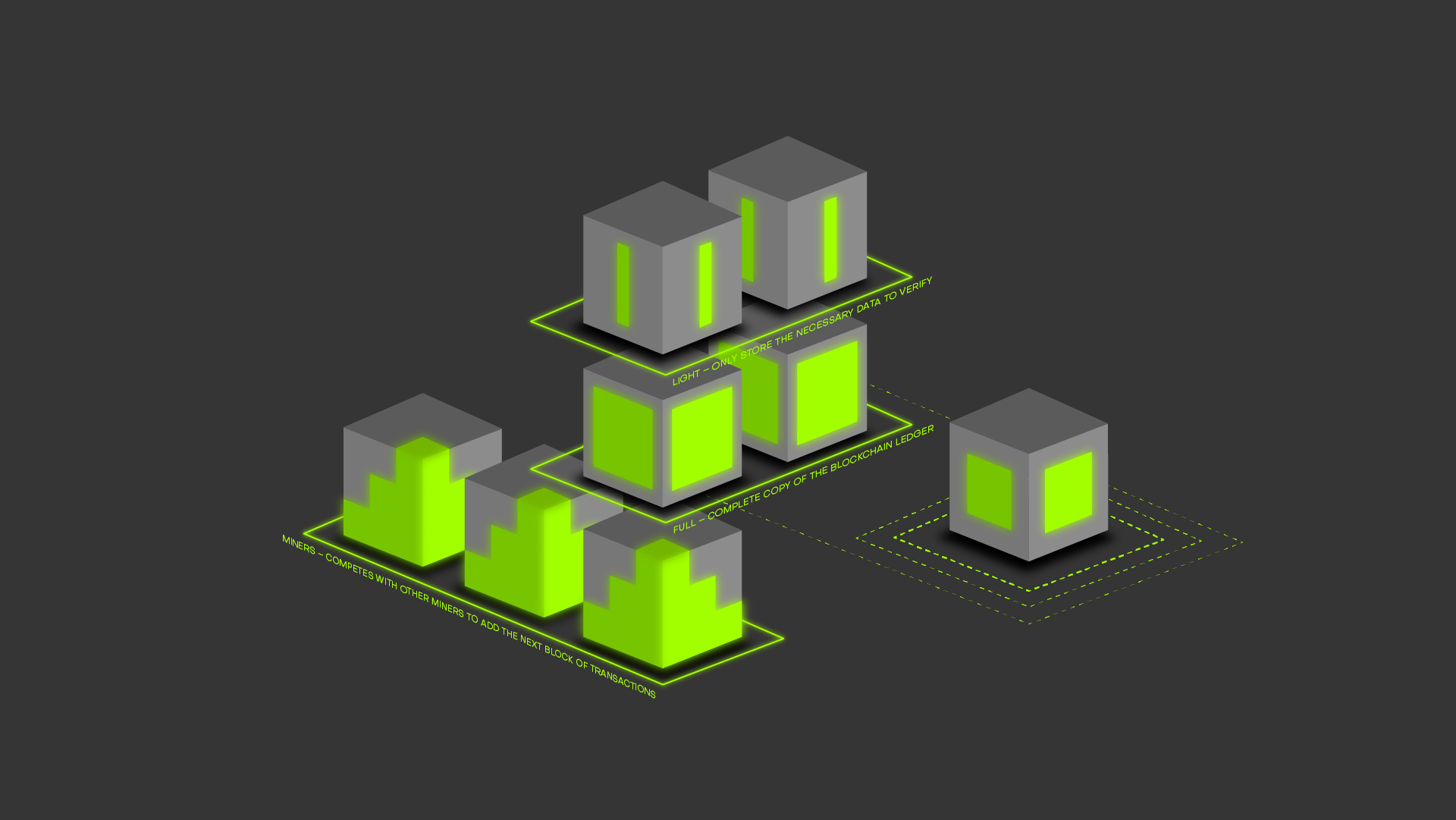All Bitcoin needs to exist is two nodes, at least one of which should be a miner. Nodes — computers running the Bitcoin software — are what make Bitcoin work. They verify all bitcoin transactions and store a ledger of all the payments in Bitcoin’s history: the blockchain. Running a node allows you to be a completely equal participant in the global digital payments system that is Bitcoin.
Most Bitcoin users don’t run a node, which means they are relying on someone else’s. What this means is that someone else’s computer is trusted to propagate their outgoing transactions to miners, validate incoming transactions as legitimate, and store a copy of the blockchain. In this regard, running your own node is incredibly beneficial. You put into practice one of the most important principles of Bitcoin; one that has become a mantra in the Bitcoin community: Don’t trust; verify. Unless you run your own node, you’re relying on third parties to validate transactions, including your own. Running a node enables you – on your computer – to validate transactions on a completely equal level to everyone else on the Bitcoin network.
Transaction validation occurs in two separate instances. Validity is first checked when your node is listening for transactions relayed to its mempool that are not already in a block, and validation is done again after a block is mined to check transactions that your node’s mempool was not already not aware of. Before your node propagates transactions across the Bitcoin network, it checks that they are valid against a long set of criteria. The most important criterion for validity is that the sum of input values must be greater than the sum of outputs. In other words, your computer checks that all Bitcoin transactions are actually requesting to spend money that exists rather than counterfeiting new money. A host of other things are checked by your node when building a mempool including the transaction size, the fee, the locking and unlocking scripts, and much more. The second stage of node validation occurs after a new block has been found by a miner. Only valid blocks are propagated across the network, as each node independently ensures they are valid before forwarding them to their peers. This brings us to an important point: miners are not trusted parties. For example, nodes will reject a block if the Proof of Work is insufficient, or if the miner rewards themselves with a million new bitcoins. By running a full node, you quite literally trust no one. Instead of trusting, you verify.
In addition to benefiting you individually, running a node is a voluntary way to contribute to the entire Bitcoin project. Just by running the Bitcoin software on your computer, you are helping make Bitcoin more robust and decentralised. We said at the beginning that all Bitcoin needs to exist is two nodes – which is true. But when there are more nodes in different geographic locations, it becomes increasingly complex to coordinate a simultaneous physical attack on the Bitcoin network. It is this distribution that makes it possible for there to be rules without rulers. Decentralisation is not only the key philosophy of Bitcoin from an ideological standpoint, but necessary for its survival. Previous forms of electronic money failed because their dependence was concentrated in one physical location. Bitcoin, in contrast, has no single point of failure. Bitcoin can’t be externally stopped because there’s no headquarters to bomb, raid, or shut-down. The more people run nodes, the more this statement holds true.
Thousands of computers running the Bitcoin software produce the blockchain, which is an immutable record of every transaction in Bitcoin’s history. Bitcoin’s immutability is enforced physically since an infeasible amount of Proof of Work would be required to change transaction history. Bitcoin’s immutability is also enforced socially since everyone must agree on the same rules for transactions, not just the order of transactions. Any user who changes the rules in their favor does not derail or destroy the software for everyone else, the cheating node merely creates an invalid fork that no other nodes besides its creator recognize as legitimate. The Bitcoin blockchain is a record of historical truth that cannot be deleted. It is not stored centrally or changed easily. By running your own node, you make the Bitcoin blockchain that much more indestructible.
Thus, Bitcoin’s success has necessitated the collective impact of thousands of volunteers running nodes. This small action makes Bitcoin that much stronger and decentralised. But perhaps more importantly, it means that you are in complete control. You are verifying that everyone else is playing by the rules, that no one cheats in the monetary system you are a part of. You are doing your part creating an “electronic payment system based on cryptographic proof instead of trust, allowing any two willing parties to transact directly with each other without the need for a trusted third party”. Running a Bitcoin node is the wonderful intersection of individualism and altruism. You should give it a try.








